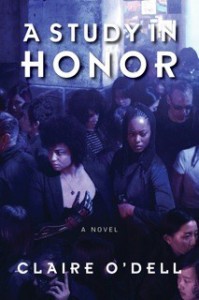Good start to (hopefully) a series

So, if you are a Sherlock Holmes purist, this is not the book for you. For instance, if you are like my dad who believes the Rathbone movies are the only ones where Sherlock is allowed to be modern, you most likely wouldn’t like this book. (My dad hates the BBC recent Sherlock series. Hates it. I don’t like for it entirely different reasons. My dad, however, admits that Disney’s Great Mouse Detective is good but that’s because Basil is named after Rathbone). I’m not judging by the way. I totally get that; my limits test is how adaptions do Adler (which begs the question why is she so often a villain and in love in Holmes, considering that in the original story she was neither).
If, however, you like Sherlock stories that are alternate version – like say Elementary (which was far superior to the BBC’s redo – then this might be the book for you.
First, the book is a gender and race bent Sherlock and Watson. So, Holmes and Watson are queer, black, American women. Second, the book takes place in the near future. It is an America that is post Trump and post liberal successor to Trump. Her election and her policies (which include addressing racism in the justice system) led to a second secession and terrorist attacks by those who wish to secede. The near, and hopefully alternate future, allows for DC to have some changes (there is a Georgetown Metro stop, for instance). Third, the book does actually deal with PTSD that those in the armed forces suffer. It really is the first real look at what Watson would have been like after being injured in a war and adjusting to that injury. The mystery that Holmes and Watson are tasked to solve has to do with the military, unparticular treatment of the enlisted (largely majority) by those higher in rank. This excellent because it dwells on the question we have of lower classes/minorities being a largely percentage of the military but the white power structure sending them into battle.
The world building in the book is excellent. The near future that O’Dell has imagined is one that could happen. It’s true that it seems a bit strange that Watson wouldn’t have any friends still left in DC when she returns after her time in the army. But the politics are believable. Janet, too, feels like a very believable character. (I should note that the author of the book presents as white, and I am white so my perspective on this would be limited). Racism is not disregarded, and part of Janet most negotiates is sexism and racism (there is a stand out scene where Janet cannot get into her apartment and the police are called). Holmes is the right type of mysterious, at times crossing boundaries (which seems to be a modern take on the character), but Sara Holmes is also interesting enough to want to know more about.
What I also love are the refences to various books. Big name fantasy writers are mentioned but so are those who are well loved but, perhaps, don’t have the same name level recognition. You can believe that Watson likes to read. It isn’t the lip service to reading that exists in some books.
The book isn’t perfect – the pacing is a little slow. You don’t entirely care because of the world building and the characters (the majority of characters are women of color, and for the most part, the women actually respect each other), but is a more slow-paced novel. The ending, strangely, feels a bit rushed and almost too neatly tied up in some ways.
While not perfect, the book was highly enjoyable. If you Sherlock Holmes and don’t mind a modern take, this is a book to check out.
 1
1








